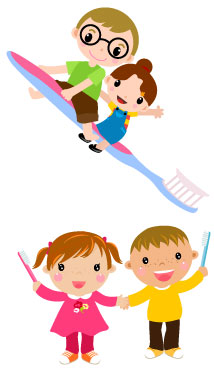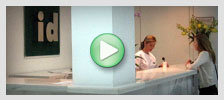
Paediatric dentistry and dental prevention
La odontopediatría es la rama de la Odontología que trata a los niños.
El odontopediatra se encarga de detectar anomalías dento-maxilares, de hacer un tratamiento restaurador de los dientes de leche y de los definitivos presentes.
El tratamiento restaurador consiste en:
- Usar sellados de fisura, rellenando los huecos de los dientes para evitar posibles caries
- Tratar las caries y sus consecuencias
- Curar los traumatismos dentales
Tienen también una función de información a los padres de prevención e higiene.
¿Qué es una caries?
Es una enfermedad que destruye el diente debido a unas bacterias. Afecta al diente de leche y al diente definitivo.
¿Por qué es conveniente tratar los dientes de leche, si se van a caer?
Los dientes definitivos se forman debajo de las raíces de los de leche, y cualquier infección en el diente de leche puede afectar al definitivo.
¿Qué es lo que produce la caries?
- La ausencia de cepillado
- El comer a menudo y sobretodo alimentos dulces y pegajosos (caramelos)
- El consumo frecuente de bebidas dulces y/o ácidas (gaseosas)
- Los chupetes o biberones con líquidos azucarados toda la noche
¿Cómo prevenir las caries?
Consulte con su dentista por primera vez entre los 18 meses y 3 años, y después cada año.
Este examinará a su hijo y le dará consejos.
- Cepille los dientes 2 veces al día como mínimo (por la mañana y por la noche después de la cena)

| Edad | Erupción de los dientes temporales |
|---|---|
| 6 meses | Incisivo central inferior |
| 7-9 meses | Incisivo central superior y lateral superior |
| 12 meses | Primer molar inferior |
| 14 meses | Primer molar superior |
| 16 meses | Canino inferior |
| 18 meses | Canino superior |
| 20 meses | Segundo molar inferior |
| 24 meses | Segundo molar superior |
| Dentición permanente | |
| 6-7 años | incisivo central inferior |
| 7-8 años | incisivo central superior y lateral inferior |
| 8-9 años | incisivo lateral superior |
| 9- 10 años | Canino inferior |
| 10-11 años | Primer premolar superior |
| 11- 12 años | Segundo premolar inferior y canino superior |
| 12- 13 años | Segundo molar superior |
| A partir de los 17 años | Muelas del juicio |
¿Qué debo hacer si los dientes están apiñados?
Consulte a su dentista, le dirá lo que debe hacer y cuando debe consultar al Ortodoncista.
¿Qué debo hacer en caso de traumatismo con pérdida de parte o totalidad de un diente?
Consulte a su dentista para tratar y valorar las consecuencias.
En caso de pérdida del diente definitivo (entero) conservarlo en la boca, en leche o en suero fisiológico sin manipularlo y acuda urgentemente a su dentista.
Desde que empiezan a salir los primeros dientes hasta 2 años utilice un cepillo pequeño y una crema sin flúor porque se la tragan.
A partir de los 2 años y medio es conveniente usar dentífricos con flúor pero con una concentración adecuada.
Hasta los 6 años el niño no es capaz de limpiarse bien los dientes. Es conveniente que sean los padres quienes lo hagan.
A partir de 6 años, según el niño, tendrá capacidad para hacerlo bien.
- Evite que el niño este todo el día comiendo y consumiendo bebidas dulces
- Ponga solo agua en el biberón de la noche
- No chupe usted la cuchara o el chupete antes de dárselo
¿Por qué mi hijo rechina los dientes por la noche?
El bruxismo nocturno es inconsciente y es producido por la contracción repetitiva de los maseteros que son los músculos de la masticación.
Normalmente sucede en los primeros momentos del sueño y pasa cuando éste es más profundo.
El bruxismo en los niños, suele aparecer entre los cuatro y seis años y suele desaparecer cuando salen los dientes permanentes.
Este hábito puede ocasionar desgaste y deterioro dental además de enfermedades de las encías.
Todavía no se conocen cuales son los motivos del bruxismo, pero podría estar ligado a estados de estrés emocional, la ansiedad, la postura al dormir, los parásitos o a ciertos trastornos.
El tratamiento consiste en corregir los factores que propician este hábito. También puede favorecer que le niño no vea violencia en la televisión, tomar un baño relajante antes de irse a dormir y si por la noche oye el rechinar de sus dientes, cambiarlo de posición.
¿Debo darle flúor a mi hijo?
El flúor es un complemento eficaz del cepillado. Pero el exceso de flúor es tóxico y puede provocar la Fluorosis. Siempre debe ser recetado por su odontólogo o su pediatra a dosis adaptadas a la edad y peso del niño.
La importancia de la toma de pastillas de Flúor por vía oral ha ido disminuyendo y en cambio la aplicación tópica ha demostrado que los índices de caries han disminuido considerablemente.
El objetivo del flúor tópico es formar flúor apatita en el periodo post eruptivo de las piezas dentarias.
A nivel profesional, aplicamos gel de flúor en cubetas desechables.
Se aconseja hacerlo 3 veces al año.

